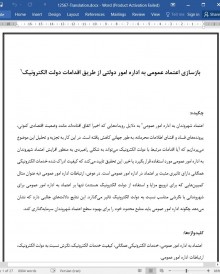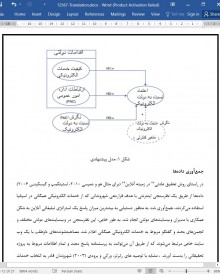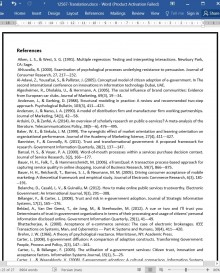
دانلود مقاله بازسازی اعتماد عمومی به اداره امور دولتی از طریق اقدامات دولت الکترونیک
چکیده
اعتماد شهروندان به اداره امور عمومی به دلایل رویدادهایی که اخیرا اتفاق افتادهاند مانند وضعیت اقتصادی کنونی، پروندههای فساد و افشای اطلاعات محرمانه، به طور جهانی کاهش یافته است. در این کار به تجزیه و تحلیل این موضوع میپردازیم که آیا اقدامات مرتبط با دولت الکترونیک میتواند به شکلی راهبردی به منظور افزایش اعتماد شهروندان به اداره امور عمومی مورد استفاده قرار بگیرد یا خیر. این تحقیق تایید میکند که کیفیت ادراک شده خدمات الکترونیکی همگانی دارای تاثیری مثبت بر اعتماد در اداره امور عمومی است. در عوض، ارتباطات اداره امور عمومی (به عنوان مثال کمپینهایی که برای ترویج مزایا و استفاده از دولت الکترونیک هستند) تنها بر اعتماد به اداره امور عمومی برای شهروندانی با نگرشی مناسب نسبت به دولت الکترونیک تاثیر میگذارد. این نتایج دلالتهای جالبی دارد که نشان میدهد چگونه اداره امور عمومی باید منابع محدود خود را برای بهبود سطح اعتماد شهروندان سرمایهگذاری کند.
مقدمه
دولتهای سراسر جهان با چند رویداد اخیر مواجه هستند از جمله وضعیت اقتصادی کنونی، پروندههای فساد، اطلاعات منتشر شده توسط وبسایتهایی مانند ویکیلیکس ، افشاگریهای اسنودن و سایر موارد اینچنینی که اعتماد شهروندان به اداره امور عمومی را تا حد قابل توجهی کاهش داده است (یلدیز و سایلام 2013). گزارشهای اخیر نشان میدهند که اعتماد به دولت و نهادهای دولتی بزرگترین سقوط قرن را تجربه میکنند و این کاهش اعتماد در کشورهای اروپایی مانند اسپانیایی بیشتر از سایر کشورها است (بانسیتر و کونولی 2011 شرکت تعالی 2012). به طور خلاصه، کمتر از نیمی از جمعیت در سراسر جهان به نهادهای دولتی متکی هستند (شرکت تعالی 2012). با این حال، دولتها نیاز به اعتماد و همکاری شهروندان برای تضمین موفقیت ابتکارات عمومی دارند (مانند پروژههای دولت الکترونیک، سیاستهای عمومی جدید و سایر موارد) و باید مزایای مورد انتظار را برای کل جامعه بدست آورند (کولساکیر و لی کلی 2008). در این راستا، اعتماد شهروندان به اداره امور عمومی به منظور تقویت رابطه بین شهروندان و اداره امور عمومی در بلند مدت ضروری است (وارکینتین ، ژفن ، پاولو و رز 2002). بنابراین، نیاز مدیریتی برای درک بهتر این موضوع وجود دارد که در کدام اقدامات اداره امور عمومی باید منابع محدود آنها به منظور بهبود سطح اطمینان در میان شهروندان سرمایهگذاری شود.
محدودیتها و تحقیقات آتی
به رغم این نتایج جالبی که از این کار حاصل شد محدودیتهایی نیز وجود دارد که همین محدودیتها به ما امکان این موضوع را میدهد چشمانداز جالبی برای تحقیقات آتی را ایجاد کنیم. اول از همه، ضروری است که توجه داشته باشید که دادهها پس از یک فرآیند غیر تصادفی جمعآوری شدهاند و این نظرسنجی به طور انحصاری توسط کاربران اسپانیایی زبان خدمات الکترونیکی همگانی در اسپانیا پاسخ داده شده است. از آنجایی که مطالعات قبلی بیان داشتند که تفاوتهای فرهنگی ممکن است بر پذیرش دولت الکترونیک تأثیر بگذارد (به عنوان مثال، کارتر و وراک کدی، 2008) نتایج ابتکارات دولت الکترونیک ممکن است در فرهنگهای مختلف، متفاوت باشد. بنابراین برای تعمیم نتایج این تحقیق ما باید این مطالعه را با استفاده از نمونهای گستردهتر از پاسخدهندگان از نظر تنوع ملیتی و فرهنگی تکرار کنیم (برای مثال آسیاییها و افریقاییها و غیره) و همچنین باید به تجزیه و تحلیل خدمات الکترونیکی همگانی در کشورهای مختلف بپردازیم.
دوم اینکه ما تنها ارتباطات اداره امور عمومی مستقیم را در مدل تحقیقاتی خود در نظر گرفتیم زیرا هدف این مقاله تنها بررسی این موضوع بود که آیا اقدامات مرتبط با دولت الکترونیک بر اعتماد مردم به اداره امور عمومی تاثیر میگذارد یا خیر. همانطور که گفته شد ممکن است که اطلاعات خارجی حاصل از منابع میانفردی (مثل فامیل، دوست یا غیره) یا حتی اطلاعاتی که از سوی رسانههای جمعی میآید، میتواند بر اعتماد به اداره امور عمومی تاثیر بگذارد (یلدیز و سایلام 2013). بنابراین راهی جالب برای گسترش این تحقیق ممکن است تحلیل سایر منابع اطلاعاتی باشد که بر سطح اعتماد شهروندان در اداره امور عمومی تأثیر بگذارد.
Abstract
Citizen trust in the public administration has been reduced worldwide due to recent events such as the current economic situation, corruption cases or disclosure of classified information. This work analyzes whether e-government related actions could be strategically employed to increase citizen trust in the public administration. This research confirms that perceived quality of public e-services has a positive effect on trust in the public administration. In turn, public administration communication (i.e., campaigns to promote the benefits and use of e-government) only influence trust in the public administration for citizens with a favorable attitude towards e-government. These results have interesting implications suggesting in which ways public administration should invest their limited resources in order to recover the levels of citizen trust.
Introduction
Governments worldwide are facing several recent events --- i.e. the current economic situation, corruption cases, the information published by websites such as WikiLeaks, the Snowden’s affair and so on --- which are diminishing citizen trust in public administration to a great extent (Yildiz & Saylam, 2013). Recent reports suggest that trust in governments and public institutions are experiencing the greatest decline of the century, being this decrease especially large in European countries as Spain (Bannister & Connolly, 2011; Corporate Excellence, 2012). In sum, less than half of the population all over the world relies on public institutions (Corporate Excellence, 2012). However, governments need citizens’ trust and collaboration to guarantee the success of public initiatives (such as e-government projects, new public policies, etc.) and obtain their expected benefits for the whole society (Kolsaker & Lee-Kelley, 2008). In this respect, citizens’ trust in public administration is crucial to enhance the relationship between citizens and public administration in the long-term (Warkentin, Gefen, Pavlou, & Rose, 2002). Therefore, there is a managerial need to better understand in which actions public administration must invest their limited resources in order to recover the levels of trustworthiness among citizens.
Limitations and future research lines
In spite of these interesting results, this work has some limitations that allow us to establish interesting lines for future research. First of all, it is important to note that data were collected following a non-random process, and the survey was answered exclusively by Spanishspeaking users of public e-services in Spain. Since previous studies propose that cultural differences may affect egovernment adoption (e.g., Carter & Weerakkody, 2008), the outcomes of e-government initiatives may differ across cultures too. Thus, to generalize the results of this research, we should repeat the study using a wider sample of respondents that represent a greater diversity of nationalities and cultures (e.g., Anglo-saxon, Asian, etc.), and that analyze public e-services from different countries.
Second, we have only considered direct public administration communication in our research model because the aim of the paper is to analyze whether government actions related to e-government affect trust in the public administration. As we have said, it is possible that external information coming from interpersonal sources (family, friends, etc.), or even from the mass media can also influence trust in the public administration (Yildiz & Saylam, 2013). Therefore, an interesting route to extend this research may be the analysis of other information sources influencing the levels of citizen trust in the public administration.
Hypothesis 1. Public e-service quality has a positive influence on trust in the public administration.
Hypothesis 2. Public administration communication has a positive influence on trust in the public administration.
Hypothesis 3. A positive attitude toward e-government reinforces the influence of public administration communication on trust in the public administration.
فرضیه 1: کیفیت خدمات الکترونیکی همگانی تاثیر مثبتی بر اعتماد به اداره امور عمومی دارد.
فرضیه 2: ارتباطات دولتی تاثیر مثبتی بر اعتماد به اداره امور عمومی دارد.
فرضیه 3: نگرش مثبت به دولت الکترونیک تأثیر ارتباطات اداره امور عمومی را بر اعتماد به اداره امور عمومی تقویت میکند.
چکیده
مقدمه
چهارچوب تحقیقاتی
اعتماد در اداره امور عمومی
سوابق اعتماد در اداره امور عمومی
کیفیت خدمات الکترونیک
ارتباطات اداره امور عمومی
جمعآوری دادهها
اعتبارسنجی اندازهگیریها
نتایج
آنالیز تعقیبی
نتیجهگیری و پیامدهای مدیریتی
محدودیتها و تحقیقات آتی
منابع
Abstract
Introduction
Research framework
Trust in the public administration
Antecedents of trust in the public administration
E-service quality
Public administration communication
Data collection
Measures validation
Results
Post hoc analysis
Conclusions and managerial implications
Limitations and future research lines
References
- اصل مقاله انگلیسی با فرمت ورد (word) با قابلیت ویرایش
- ترجمه فارسی مقاله با فرمت ورد (word) با قابلیت ویرایش، بدون آرم سایت ای ترجمه
- ترجمه فارسی مقاله با فرمت pdf، بدون آرم سایت ای ترجمه



